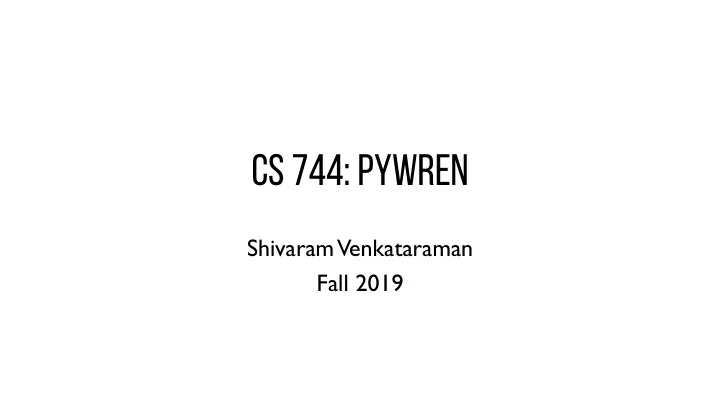

CS 744: PYWREN Shivaram Venkataraman Fall 2019
ADMINISTRIVIA Happy Thanksgiving!?
NEW HARDWARE MODELS
Infiniband Networks Compute Accelerators Serverless Computing Non-Volatile Memory
SERVERLESS COMPUTING
MOTIVATION: USABILITY What instance type? What base image? How many to spin up? What price? Spot?
ABSTRACTION LEVEL ? Logistic Regression Application Application Compute Spark Framework Compute Framework Amazon EC2 CloudLab Hardware Private Cluster …
STATELESS DATA PROCESSING
“Serverless” computing 300 900 seconds single-core 512 MB in /tmp 3GB RAM Python, Java, node.js
PYWREN API
PYWREN: how it works future = runner.map(fn, data) future.result() your laptop the cloud
how it works future = runner.map(fn, data) data data func data Serialize func and data Put on S3 pull job from s3 Invoke Lambda download anaconda runtime python to run code pickle result stick in S3 future.result() poll S3 result unpickle and return your laptop the cloud
STATELESS FUNCTIONS: WHY NOW ? What are the trade-offs ?
MAP and REDUCE ? Input Output Data Data
PARAMETER SERVERS get Use lambdas to run “workers” update Parameter server as a service ? Parameter Server
WHEN Should we use SERVERLESS ? Yes! Maybe not ?
SUMMARY Motivation: Usability of big data analytics Approach: Language-integrated cloud computing Features - Breakdown computation into stateless functions - Schedule on serverless containers - Use external storage for state management Open question on scheduling, overheads
DISCUSSION https://forms.gle/Y9AFUpvVBA7LpKqh7
Consider you are a cloud provider (e.g., AWS) implementing support for serverless. What could be some of the new challenges in scheduling these workloads? How would you go about addressing them?
OPEN QUESTIONS - Scalable scheduling: Low latency with large number of functions ? - Debugging: Correlate events across functions ? - Launch overheads: Fraction of time spent in setup (OpenLambda) - Resource limits: 15 minute AWS Lambda (Oct 2018)
Recommend
More recommend